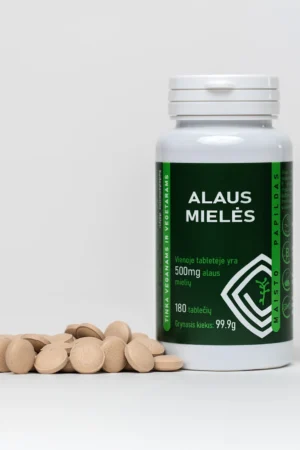Brewer’s Yeast Tablets: Benefits, Uses, and Nutrition Guide
Brewer’s yeast tablets are a natural supplement known for their rich content of B vitamins, protein, and minerals. They are often used to support skin health, boost the immune system, and improve hair strength. These tablets offer a convenient way to add essential nutrients to the diet, which can support energy levels and overall well-being.
Each tablet contains 500 mg of brewer’s yeast, with a bottle typically holding 180 tablets. The supplement is suitable for vegetarians and vegans, making it a good choice for those looking to enhance their nutrition without animal products.
People may take brewer’s yeast tablets to help with digestion, mood balance, and maintaining a healthy complexion. The product is also popular among individuals involved in physical activities due to its potential to aid in managing fatigue and supporting strength.
What Are Brewer’s Yeast Tablets?

Brewer’s yeast tablets are dietary supplements made from inactive yeast. They provide important nutrients like proteins, vitamins, and minerals in a convenient form. These tablets come with specific ingredients and dosage guidelines designed for daily use.
Key Ingredients and Composition
Brewer’s yeast tablets mainly contain Saccharomyces cerevisiae, a yeast that is grown and then deactivated after the brewing process. The yeast itself is rich in protein and contains all nine essential amino acids the body cannot produce.
The tablets are also a strong source of B-complex vitamins, including B1 (thiamine), B2 (riboflavin), B3 (niacin), B5 (pantothenic acid), B6 (pyridoxine), and B9 (folate). These vitamins support energy production and brain function.
In addition to yeast, tablets include small amounts of glucose syrup and natural adhesives like vegetable magnesium stearate and silicon dioxide. Some formulations may contain gluten due to the barley or wheat substrate used in yeast growth.
Forms and Dosage Options
Brewer’s yeast tablets typically come in bottles containing 180 tablets, each tablet weighing 500 mg. The recommended daily intake usually ranges from 2 to 4 doses, with 2 tablets taken per dose.
Users can adjust the dosage between 2 to 8 tablets a day based on their nutritional needs or health goals. Tablets are designed for easy swallowing and can be taken with water.
It is advised to store the tablets in a cool, dry place to maintain quality and effectiveness. The product’s shelf life generally extends until the year 2027 when stored properly.
Health Benefits of Brewer’s Yeast Tablets
Brewer’s yeast tablets provide key nutrients and natural compounds that support different areas of health. They help improve digestion, boost the immune system, supply important B vitamins, and promote skin, hair, and nail health. Each benefit is linked to specific properties found in the yeast.
Digestive Health Support
Brewer’s yeast contains natural fibers that aid digestion. These fibers help regulate bowel movements and prevent constipation. It also supports a balanced gut microflora by encouraging the growth of good bacteria.
The presence of inactive yeast helps the digestive system work more efficiently, especially after changes in diet or periods of stress. This makes brewer’s yeast tablets helpful for people looking to maintain or improve their digestive health naturally.
Immune System Enhancement
Brewer’s yeast can stimulate the body’s immune response. It encourages the production of white blood cells, which are crucial for defending against infections and illnesses.
Taking brewer’s yeast tablets may strengthen the body’s natural defenses. This immune boost can be especially valuable during cold and flu season or times when the immune system needs extra support.
Vitamin B Complex Source
Brewer’s yeast is rich in B vitamins, including B1 (thiamine), B2 (riboflavin), B3 (niacin), B5 (pantothenic acid), B6 (pyridoxine), and B9 (folate). These vitamins play a central role in energy production and brain function.
These B vitamins help convert food into energy and support nerve health. For people with vegan or vegetarian diets, brewer’s yeast tablets offer an important source of these essential nutrients.
Skin, Hair, and Nail Health
The antioxidants found in brewer’s yeast help protect skin cells from damage caused by free radicals. This support may improve skin tone and reduce acne symptoms.
Brewer’s yeast also contains nutrients that strengthen hair structure and reduce hair loss. It promotes healthier nails by providing proteins and minerals important for their growth and strength.
How to Use Brewer’s Yeast Tablets Effectively

Using brewer’s yeast tablets correctly helps get the most benefit. Proper dosage, timing, and knowing who should avoid it are key to safe, effective use.
Recommended Daily Intake
The usual dose is 2 tablets taken 2 to 4 times a day. Each tablet contains 500 mg of brewer’s yeast. This means a daily intake can range from 2,000 mg (4 tablets) to 4,000 mg (8 tablets).
It’s best to spread doses evenly throughout the day to maintain steady nutrient levels. Some people may start with a lower dose to check for any side effects.
This dosage aligns with common guidelines and provides enough brewer’s yeast to support energy and digestion without overdoing it.
Best Practices for Absorption
Taking brewer’s yeast tablets with meals helps reduce any stomach discomfort. It also supports better absorption of nutrients.
Drinking plenty of water when taking the tablets aids digestion and prevents potential bloating. Avoid taking the tablets right before sleep to minimize any digestive disturbance.
Some users mix brewer’s yeast powder into food or drinks to mask its strong taste, but tablets offer a more convenient option. Consistency in use improves overall results.
Who Should Avoid Brewer’s Yeast Tablets
People with allergies to yeast should not take brewer’s yeast tablets. Those with certain medical conditions, such as Crohn’s disease or ulcerative colitis, should consult a doctor before use.
It may interact with some medications, especially antidepressants, so medical advice is important when using the tablets alongside other drugs.
Pregnant and breastfeeding women should only use brewer’s yeast tablets under medical supervision. Children’s use should also be guided by a healthcare professional.
Safety, Side Effects, and Product Selection
Brewer’s yeast tablets offer nutritional benefits but require attention to safety, possible drug interactions, and supplement quality. Users should be aware of who should avoid it and how to pick a reliable product.
Potential Interactions
Brewer’s yeast contains tyramine, which can raise blood pressure when combined with certain depression medications called MAOIs. This combination should be avoided to prevent dangerously high blood pressure.
It can also interact with lithium. Some brewer’s yeast contains lithium, which may increase lithium levels in the body and lead to serious side effects. Those on lithium should consult a doctor before use.
For people taking diabetes medications, brewer’s yeast may lower blood sugar further. Careful blood sugar monitoring is needed to avoid hypoglycemia.
Side Effects and Precautions
Common side effects include headache, stomach discomfort, and gas. These usually occur with oral use and are typically mild.
Long-term safety is not well known. Pregnant or breastfeeding women and young children are advised to avoid brewer’s yeast due to limited safety data.
People with Crohn’s disease should not use brewer’s yeast, as it might worsen symptoms. Those with weak immune systems, such as individuals with HIV/AIDS or cancer, should consult a healthcare provider because of infection risks.
Choosing a Quality Supplement
Look for brewer’s yeast products that list clear ingredient information and come from reputable brands. Products should specify if they contain live or non-living yeast.
Tablets with added B vitamins or chromium may provide extra benefits, but it’s important to follow the recommended dose on the label or a healthcare provider’s advice.
Storage matters; keep tablets in a cool, dry place to preserve potency. Checking for third-party testing or certifications can also help ensure product purity and safety.
